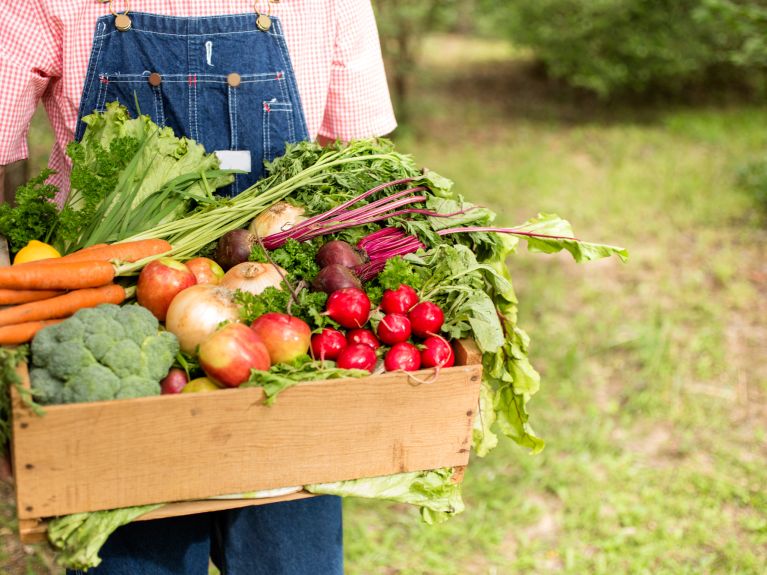More organic farming
Ambitious plans: Germany aims to promote organic farming.

There is growing demand for organically produced food. The European Union (EU) is the second largest single market for organic products after the USA, and Germany is the largest organic food market in the EU. In 2017 the sector achieved annual sales of just over ten billion euros in Germany. The Federal Government is supporting the expansion of organic farming.
What is the goal of the Organic Farming – Looking Forwards strategy?
Twenty per cent of agricultural land in Germany is to be organically farmed by 2030. This target is part of the Federal Republic’s Sustainability Strategy. The coalition agreement also envisages advances in the digitalisation of agriculture, for example, to reduce the use of pesticides and fertilisers on fields and drugs in livestock farming.
What are the advantages of organic farming?
It protects the environment because it makes do without pesticides and chemical fertilisers, helps preserve soil fertility and species diversity and also meets the requirements of species-appropriate animal husbandry.
Dieses YouTube-Video kann in einem neuen Tab abgespielt werden
YouTube öffnenThird party content
We use YouTube to embed content that may collect data about your activity. Please review the details and accept the service to see this content.
Open consent formHow many organic farms are there in Germany?
According to BÖLW (Organic Food Production Alliance), there are some 30,000 organic farms. This is roughly one tenth of all agricultural enterprises. To achieve the government target, a further 30,000 to 40,000 farmers would have to change over to organic farming.
How much progress has been made?
When the strategy was launched in 2015, Germany was significantly behind other EU countries with roughly 6% of cultivated land farmed organically. This total is now increasing in small steps: organic acreage reached 8.2% in 2018. In 2017, according to figures published by BÖLW, on average five farmers converted an agricultural area of roughly 500 football fields to organic production every day. The Ministry of Agriculture plans to publish the first interim results of the Organic Farming – Looking Forwards strategy in 2019.
What is the German Bio-Siegel?
In 2001, Germany introduced the Bio-Siegel, a government standard and seal for organic products. A six-sided logo with green edges identifies food products that have been produced and monitored in compliance with the EU legal requirements for organic agriculture. A total of 77,841 products currently bear the German Bio-Siegel mark.
Newsletter #UpdateGermany: You would like to receive regular information about Germany? Subscribe here to:

